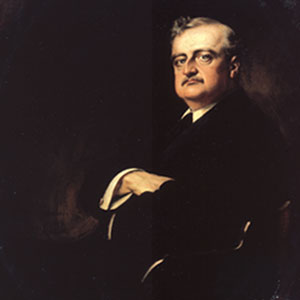100 YEARS AGO: John Redmond dies
Published in Issue 2 (March/April 2018), Volume 26By Joseph E.A. Connell Jr

Above: John Redmond by Henry Jones Thaddeus. (NGI)
John Edward Redmond was a barrister, a writer and a nationalist politician. He was an MP and was leader of the Irish Parliamentary Party (IPP) from 1900 to 1918. He was, for the time, a moderate, constitutional and conciliatory politician, and he attained the twin dominant objectives of his political life—party unity and finally, in September 1914, the promise of Home Rule. It is for the latter that he is probably best remembered, and which has led to his often misunderstood and controversial legacy.
His father was an MP, as was his uncle, and he came from a prominent Catholic gentry family in Wexford. His brother, Willie, was also elected to parliament, as was his son, so the family pedigree was one of service. His mother, however, was a Protestant from a unionist family, and although she converted to Catholicism she never became a nationalist. Redmond himself boasted of the family’s involvement in the 1798 Wexford rebellion. Like so many, his was a rather complex family background.
He was elected to parliament for New Ross in 1881, for North Wexford from 1885, and for Waterford City until his death in 1918. When he was first elected the Land War was in full swing, and he and Willie were involved in the agrarian agitation of the 1880s. After the IPP split over Parnell’s affair with Katherine O’Shea, Redmond stood with Parnell; after Parnell died, Redmond really devoted his time to more land reforms. When he was elected party leader in 1900 it was as a compromise candidate, owing to the personal rivalries between the anti-Parnellite IPP leaders. Therefore he never had as much control over the party as his predecessor, and his authority and leadership were a balancing act.
With the Lords’ veto abolished under the Parliament Act of 1911, Home Rule became a realistic proposition. In the wake of two inconclusive general elections in 1910, Redmond used his leverage to persuade the Liberal government of Prime Minister H.H. Asquith to introduce the third Home Rule bill in April 1912. The Lords could no longer block it, but they could delay its enactment for two years. Redmond had gone much further than any of his predecessors in shaping British politics to the needs of the Irish. He underestimated the Ulster unionist opposition, however, and this really doomed Home Rule. He knew little of Ulster or the intensity of unionist sentiment against Home Rule. And when most unionist leaders, especially Sir Edward Carson, threatened the use of force to prevent Home Rule, Redmond judged them to be merely bluffing. This was a fatal error.
Almost everything that Redmond did at the time was with the intention of getting Home Rule for Ireland. He always mistrusted the Irish Volunteers because of IRB involvement, and only after he was permitted to nominate half the seats on its provisional committee in June 1914 did he give his approval to the Volunteer movement. The Volunteers split in September 1914 when Redmond, in the hope of ensuring the enactment of the Home Rule Act 1914, encouraged the Volunteers to support the British war commitment and to join Irish regiments of the British Army. That split left the IRB firmly—if surreptitiously—in control of the Volunters and they remained so until the Rising.
In June 1917 Redmond accepted David Lloyd George’s proposal for a convention to discuss Home Rule, but that concluded in March 1918 with little progress. By then the political landscape had changed completely; sympathy for the executed 1916 leaders and opposition to conscription paved the way for Sinn Féin’s landslide victory in the general election of December 1918 and the establishment of Dáil Éireann in January 1919. Redmond wasn’t around to witness the collapse of his party. He died on 6 March 1918.
Joseph E.A. Connell is the author of Michael Collins: Dublin 1916–22 (Wordwell Books).
















